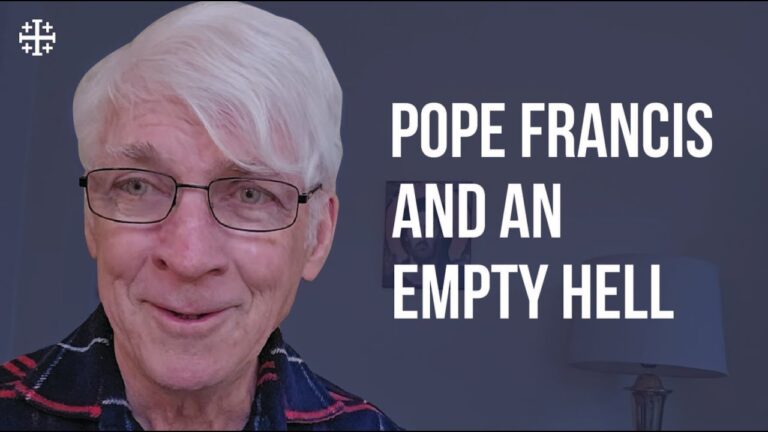Pope Francis on Hell: A New Perspective
In recent statements, Pope Francis has sparked conversations around the traditional concept of hell, challenging long-held beliefs and inviting a reexamination of faith. By emphasizing God’s mercy and the transformative power of love, the Pope encourages a dialogue that moves beyond fear and punishment, urging followers to reflect on the nature of sin and redemption. This shift not only resonates with contemporary spiritual concerns but also highlights the evolving nature of Catholic doctrine in the modern world.
What are Pope Francis’ views on hell?
Pope Francis emphasizes God’s mercy, suggesting hell is a state of separation from God rather than a physical place, and he often focuses on hope and redemption.
What are Pope Francis’ views on the existence of hell?
Pope Francis has shared his personal perspective on the existence of hell, expressing a hopeful view that it may be empty. He emphasized, “What I am going to say is not a dogma of faith but my own personal view: I like to think of hell as empty; I hope it is.” This statement reflects a compassionate and merciful approach to the concept of eternal damnation, resonating with many who seek a more hopeful interpretation of faith.
In contrast, the official teachings of the Catholic Church maintain a clear stance on the existence and eternity of hell. The Catechism of the Catholic Church affirms that hell is a reality for those who choose to separate themselves from God. This dichotomy between personal belief and doctrinal teaching illustrates the ongoing dialogue within the Church about the nature of salvation and the afterlife, inviting reflection on the balance between hope and tradition.
What were Pope Benedict’s views on hell?
Pope Benedict’s reflections on the afterlife provide a thought-provoking perspective on the fate of souls. He suggested that while the concepts of heaven and hell are significant, the reality may be more nuanced than traditionally believed. His view implies that the journey of the soul is complex, with many individuals experiencing a transitional phase rather than an immediate destination.
In his contemplation, Pope Benedict proposed that “we may suppose” that only a small number of souls might find themselves in hell. This assertion highlights a sense of hope, suggesting that the divine mercy could be more encompassing than often imagined. It invites believers to consider a compassionate view of salvation, one that acknowledges the struggles and imperfections inherent in humanity.
Furthermore, the Pope articulated a vision where the “great majority of people” may pass through purgatory before reaching heaven. This idea reinforces the belief in preparation and purification, emphasizing the importance of growth and healing in the spiritual journey. Ultimately, his insights encourage a broader understanding of the afterlife, urging individuals to reflect on their paths and the transformative power of divine grace.
What is Pope Francis’s stance on LGBTQ issues?
Pope Francis has taken significant steps to foster a more inclusive approach within the Catholic Church regarding LGBTQ issues. Under his leadership, the Dicastery for the Doctrine of the Faith has affirmed that transgender individuals can receive baptism, signaling a shift towards greater acceptance and recognition. Additionally, the recent document Fiducia supplicans has permitted the blessing of same-sex couples, reflecting a nuanced understanding of love and partnership.
The Pope’s commitment to dialogue is further evidenced by his private meetings with numerous LGBTQ individuals and activists, demonstrating his willingness to listen and learn from their experiences. This openness not only showcases his personal support but also highlights a broader effort within the Church to embrace diversity and promote compassion. Through these actions, Pope Francis encourages a more welcoming environment for all, reinforcing the idea that love in all its forms deserves recognition and respect.
Understanding the Afterlife: Insights from Pope Francis
Pope Francis has often emphasized the significance of the afterlife in the context of hope and faith. He invites believers to view death not as an end, but as a transformative passage into eternal life. This perspective encourages individuals to cultivate a deeper relationship with God, fostering a sense of peace and purpose in their earthly journey. By framing the afterlife as a continuation rather than a conclusion, he reassures the faithful that their lives hold intrinsic value and meaning.
In his teachings, Pope Francis highlights the importance of love and compassion as guiding principles in preparation for the afterlife. He stresses that our actions in this life echo in the next, urging believers to engage in acts of kindness and service to others. This call to action is a reminder that the way we treat our fellow human beings is fundamentally linked to our spiritual destiny. By embracing a life of love, we not only enrich our own souls but also contribute to a more compassionate world.
Moreover, the Pope encourages a hopeful outlook toward the afterlife, reinforcing the belief in God’s mercy and forgiveness. He reassures the faithful that no one is beyond redemption, emphasizing that divine grace is always within reach. This message of hope inspires individuals to seek reconciliation and healing in their lives, fostering a sense of community and belonging. Ultimately, Pope Francis’ insights into the afterlife serve as a guiding light, encouraging believers to live with intention, love, and an unwavering faith in God’s promises.
Rediscovering Hell: Pope Francis’ Transformative Views
Pope Francis has emerged as a transformative figure in the Catholic Church, reshaping traditional views on concepts like sin and redemption. His reflections on hell invite a deeper understanding of divine mercy, suggesting that eternal punishment may not be the sole destiny for the unrepentant. By emphasizing compassion over condemnation, he challenges believers to reconsider the nature of justice in the afterlife and encourages a more inclusive approach to faith, highlighting the importance of love and forgiveness.
This shift in perspective has resonated with many, fostering a dialogue that transcends dogma and promotes a more humane interpretation of spirituality. By advocating for a God who embraces rather than ostracizes, Pope Francis calls upon the faithful to engage with their own shortcomings and extend grace to others. In doing so, he not only redefines the narrative around hell but also invites a broader reflection on the transformative power of love in the human experience, ultimately encouraging a more hopeful vision of the future.
Beyond Fear: Pope Francis Reframes Eternal Damnation
Pope Francis has consistently challenged traditional notions of eternal damnation, inviting the faithful to reconsider their understanding of divine judgment. In his recent addresses, he emphasizes that God’s love is fundamentally redemptive rather than punitive. This perspective encourages believers to view damnation not as a predetermined fate, but as a choice that stems from a rejection of God’s grace, underscoring the notion that mercy is always extended, even in the face of sin.
In reframing the concept of hell, the Pope urges a focus on hope and transformation rather than fear and despair. He advocates for a faith that fosters compassion and a commitment to helping others find redemption. This approach shifts the narrative from one of condemnation to one that highlights the possibility of reconciliation and renewal, allowing individuals to embrace their faith without the burden of terror about their ultimate fate.
By prioritizing love and mercy, Pope Francis inspires a more inclusive understanding of spirituality, one that resonates with a world increasingly weary of fear-based ideologies. His message serves as a call to action, encouraging believers to live out their faith in ways that reflect God’s unconditional love. In this new light, eternal damnation becomes a moment of reflection rather than a source of dread, inviting all to engage with their spiritual journey more deeply and authentically.
A Compassionate Hell: Pope Francis’ Radical Approach
Pope Francis has redefined the traditional perception of hell, presenting it not as a place of eternal damnation but as a profound experience of divine mercy. His radical approach emphasizes compassion over condemnation, urging the faithful to view hell as a state of separation from God’s love rather than a physical location filled with suffering. By shifting the focus from punishment to the potential for redemption, he invites believers to cultivate a deeper understanding of God’s grace and the human capacity for change.
In his teachings, the Pope encourages individuals to reflect on their own lives and relationships, fostering a spirit of empathy and forgiveness. He highlights the importance of recognizing our shared humanity and the struggles we all face, urging society to extend compassion even to those who seem beyond redemption. This approach promotes healing and reconciliation, challenging the notion that some are irrevocably lost while others are saved.
Pope Francis’ vision for hell serves as a powerful reminder of the transformative power of love and understanding. By advocating for a compassionate perspective, he encourages individuals to confront their own shortcomings and extend grace to others. In doing so, he inspires a movement toward a more inclusive faith, one that embraces the complexity of the human experience and the possibility of hope, even in the darkest of circumstances.
The Pope’s Vision: Rethinking Punishment and Redemption
In a world where justice often feels punitive rather than restorative, the Pope’s vision of punishment and redemption offers a transformative perspective. He advocates for a system that emphasizes healing over retribution, urging societies to view offenders not merely as criminals but as individuals capable of change. This approach fosters compassion and understanding, encouraging communities to support rehabilitation efforts that address the underlying causes of criminal behavior.
Central to this vision is the belief that every person possesses inherent dignity and the potential for redemption. The Pope calls for a shift in how we perceive justice, promoting practices that prioritize restorative measures over traditional punitive systems. By focusing on reconciliation and personal growth, we can create pathways for individuals to reintegrate into society, breaking the cycle of crime and fostering a culture of forgiveness.
Ultimately, the Pope’s vision challenges us to rethink our values around justice and mercy. It invites us to consider the broader implications of our actions and policies, advocating for a system that nurtures healing and empowers individuals to reclaim their lives. Embracing this perspective can lead to more just societies, where every person has the opportunity to learn from their mistakes and contribute positively to their communities.
Pope Francis’ nuanced views on hell challenge traditional notions, inviting a re-examination of faith and morality. His emphasis on God’s mercy over eternal damnation reflects a shift towards compassion and understanding in spiritual discourse. By encouraging dialogue and introspection, the Pope not only reshapes the conversation around hell but also inspires a more inclusive approach to salvation that resonates with contemporary believers. This transformation in perspective underscores the importance of love and redemption in the human experience, urging us all to reflect on our choices and their impact on our souls.







